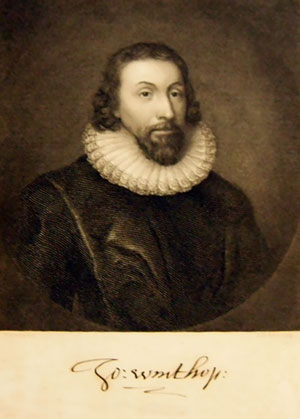Will America Be a Light to the World or a Byword for Ungodly Folly?

On March 21, 1630, at Holyrood Church in Southampton, England, Puritan leader and later Governor of the Massachusetts Bay Colony, John Winthrop, gave a warning sermon to his fellow Puritans about to depart to Boston on the Arabela. Near the end of his sermon, he used the example of a “City on a Hill,” referring to Matthew 5:14, “You are the light of the world, a city built on a hill cannot be hidden.” Winthrop was not an ordained minister; he was a lawyer, and his sermon was organized with a train of logic typical of English lawyers. But this train of logic was based on the solid truths of Scripture. His principal theme was love and the duty of godly love for one another with a pure heart and selfless fervor. In fact, his sermon was entitled, A Model of Christian Charity [Love], and his hope was that the Puritan community in Boston would become a model of Christian love, being a light and example to the world. Few if any in this party of persecuted Puritans had any ambition for New England or the American Colonies to become a great, wealthy, or politically or militarily powerful nation. Their hope was simply to live in peace and brotherly love and by their example become a beacon of divine truth and unselfish charity to the nations and their own posterity.
Winthrop's lecture was forgotten for nearly two hundred years until the Massachusetts Historical Society published it in 1839. Winthrop was neither an egalitarian nor a socialist. He believed God had given individuals and families different gifts and degrees of gifts for God’s divine purposes. Those who were especially gifted had the responsibility to sustain their gifts and their family but also use their gifts and resources, both tangible and intangible, for the common good and on occasion to assist wisely the needy and make necessary sacrifices in times of community danger and calamity. He further proclaims “We must bear one another’s burdens. We must not look only on our own things, but also on the things of our brethren.” His sermon was filled with substantiating Bible verses.
“Honor the Lord with your wealth and with the first-fruits of all your produce;”--Proverbs 3:9 ESV
“Everyone to whom much was given, of him much will be required.”—Luke 12:48b ESV
“But if anyone does not provide for his relatives, and especially for members of his household, he has denied the faith and is worse than an unbeliever.”—1 Timothy 5:8 ESV
“Beloved, let us love one another, for love is from God, and whoever loves has been born of God and knows God.”—1 John 4:7.
Based on 1 John 4:8 and Ephesians 4:16, speaking of Christ, and His Church, the body of believers being knit together by love, Winthrop declares “ Love is the Bond of Perfection.” His hope is that this bond of brotherly love and evident sacrificial generosity holding true through good times, trials, and dangers will be a light of truth and love making the Glory of God plainly visible to their own posterity and to the nations.
Then Winthrop begins to warn against moral complacency…”Thus stands the cause between God and us. We are entered into a covenant with Him for this work. We have taken out a commission… We have sought his favor and blessing. Now if the Lord shall please to hear us, and bring us in peace to the place we desire, then He…will expect a strict performance of the…[covenant on our part].”
Winthrop then tells his Puritan group plainly that if they abandon their covenant with God and His Law and “embrace this present [secular humanist] world and prosecute our carnal intentions, seeking great [material] things for ourselves and our posterity, the Lord will surely break out in wrath against us; be revenged of such a [sinful] people and make us know the price of breaking such a covenant.”
“Now the only way to avoid this shipwreck, and to provide for our posterity, is to follow the counsel of Micah, to do justly, to love mercy, to walk humbly with our God. For this end, we must be knit together, in this work, as one man. We must entertain each other in brotherly affection. We must be willing to abridge ourselves of our superfluities, for the supply of other’s necessities. We must uphold a familiar commerce together in all meekness, gentleness, patience and liberality.”
“We must delight in each other; make other’s conditions our own; rejoice together, mourn together, labor and suffer together, always having before our eyes our commission and community in the work, as members of the same body. So shall we keep the unity of the spirit in the bond of peace. The Lord will be our God, and delight to dwell among us, as his own people, and will command a blessing upon us in all our ways. So that we shall see much more of his wisdom, power, goodness and truth, than formerly we have been acquainted with. We shall find that the God of Israel is among us, when ten of us shall be able to resist a thousand of our enemies; when he shall make us a praise and glory that men shall say of succeeding plantations, “the Lord make it like that of New England.”
“For we must consider that we shall be as a city upon a hill. The eyes of all people are upon us. So that if we shall deal falsely with our God in this work we have undertaken, and so cause him to withdraw his present help from us, we shall be made a story and a by-word through the world. We shall open the mouths of enemies to speak evil of the ways of God, and all professors for God’s sake. We shall shame the faces of many of God’s worthy servants, and cause their prayers to be turned into curses upon us till we be consumed out of the good land whither we are a going.”
“I shall shut up this discourse with that exhortation of Moses, that faithful servant of the Lord, in his last farewell to Israel, Deut. 30: Beloved there is now set before us life and good, Death and evil, in that we are commanded this day to love the Lord our God, and to love one another, to walk in his ways and to keep his Commandments and his Ordinance and his laws, and the articles of our Covenant with him, that we may live and be multiplied, and that the Lord our God may bless us in the land whither we go to possess it.”
“But if our hearts shall turn away, so that we will not obey, but shall be seduced, and worship and serve other Gods, our pleasure and profits, and serve them; it is propounded unto us this day, we shall surely perish out of the good land whither we pass over this vast sea to possess it.”
“Therefore let us choose life—that we, and our seed may live, by obeying His voice and cleaving to Him, for He is our life and our prosperity.”
Both presidents John F. Kennedy and Ronald Reagan referred to Winthrop’s Biblical example of “A City built on a hill” as an inspirational moral light in their inauguration speeches.
Winthrop’s sermon is filled with exhortation that could be interpreted as a hope to make America a Shinning City on a Hill and a blessing to the world, but the theme is first and primarily spiritual and moral. It is a prayer for God’s favor, but that favor does not obligate God to maintain the United States as the wealthiest and most powerful nation in the world, nor give us any entitlement to moral superiority or authority over other nations. Moreover, it is a serious warning that we may lose favor with God, if we ignore God and place our hope in godless secular humanism, materialism, and the folly of placing our very limited wisdom and darkened moral compass over the wisdom and justice of God. Given our obvious and self-indulgent moral tail-spin and rebellion against Biblical wisdom, values, and teaching, we had best be pleading for forgiveness and mercy. May the Grace of God awaken us to our danger.
Beginning slowly during the Cold War following the end of World War II in 1945, a false interpretation of America’s Providential rise and role in the world began to capture American political thinking and ambitions. It accelerated to dominance following the fall of the Soviet Union in 1991. This false sense of American Exceptionalism has abandoned Christian salt and light as a healing example to the nations and morphed into a justification to advance American economic, cultural, and military hegemony over the world by whatever means. It has set the U.S. on a disastrous foreign policy path. This has been especially strong since the CIA invention of Color Revolutions “to advance our brand of democracy.” We are under the ungodly moral delusion that we have the right to bully and punish nations and peoples who resist our multi-facet hegemonic dominance and latest social and moral inventions. It is a formula for terrible miscalculations leading to monetary, economic, and military disaster.
Will we renew our spiritual and moral traditions and strive to become a Light to the World or will we continue on a path to become a byword for dark ungodly folly?









 Mike Scruggs is the author of two books: The Un-Civil War: Shattering the Historical Myths; and Lessons from the Vietnam War: Truths the Media Never Told You, and over 600 articles on military history, national security, intelligent design, genealogical genetics, immigration, current political affairs, Islam, and the Middle East.
Mike Scruggs is the author of two books: The Un-Civil War: Shattering the Historical Myths; and Lessons from the Vietnam War: Truths the Media Never Told You, and over 600 articles on military history, national security, intelligent design, genealogical genetics, immigration, current political affairs, Islam, and the Middle East. 


